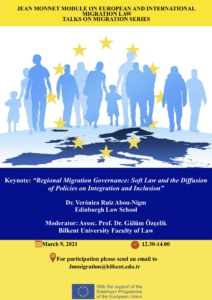Views
Nothing Found
Sorry, no posts matched your criteria
News
Nottingham Arbitration Talk on Wednesday 17 March 2021
Invitation by Dr Orsolya Toth, Assistant Professor in Commercial Law, University of Nottingham
The University of Nottingham Commercial Law Centre will hold its inaugural Nottingham Arbitration Talk on Wednesday 17 March at 2-4 pm. The Centre is delighted to welcome distinguished speakers to the event drawn from both academia and practice. The Keynote address will be given by Professor Sir Roy Goode, Emeritus Professor of Law at the University of Oxford. The speaker panel will host Angeline Welsh (Essex Court Chambers), Timothy Foden (Lalive) and Dr Martins Paparinskis (University College London).
The theme of the event will be ‘Procedure and Substance in Commercial and Investment Treaty Arbitration’. It will address current and timeless issues, such as the influence of procedure on the parties’ substantive rights, the recent phenomenon of ‘due process paranoia’ in arbitration and the current state of the system of investment treaty arbitration.
All welcome and free to attend. For detailed programme and registration please visit https://unclcpresents.eventbrite.co.uk
Webinar: Asia-Pacific Commercial Dispute Resolution in the Aftermath of the Pandemic
The COVID-19 Pandemic has impacted on commercial dispute resolution in China, Singapore and Australia. The important question is whether these impacts will be transformed into legal doctrines and shape the development of law for commercial dispute resolution in the long term.
Experienced panellists will consider how Covid-19 has promoted online trials in China, influenced forum non conveniens and other aspects of international commercial litigation in the Singapore courts, and challenged service of process outside Australia and other private-international-law related issues.
In 2021, besides this panel discussion, the Centre for Asian and Pacific Law (CAPLUS) at the Sydney Law School will organize a series of events on the (post)development of Covid-19 in the Asia-Pacific region focusing on social justice, civil rights and religion, and trade and investment legal issues.
Moderator:
Professor Vivienne Bath’s teaching and research interests are in international business and economic law, private international law and Chinese law. Professor Bath has extensive professional experience in Sydney, New York and Hong Kong, specialising in international commercial law, with a focus on foreign investment and commercial transactions in China and the Asian region.
Panellists:
Dr. Wenliang Zhang is an Associate Professor at Renmin University of China Law School. He has been teaching and doing research in the field of international disputes resolution, with a focus on international jurisdiction and global judgments recognition. His works appear in peer-reviewed international journals including Vanderbilt Journal of Transnational Law, Journal of International Dispute Settlement, Yearbook of Private International Law and Chinese Journal of International Law.
Dr. Adeline Chong is an Associate Professor at the School of Law, Singapore Management University. She has published in leading peer-reviewed journals such as the LQR, ICLQ, LMCLQ and JPIL. She is the co-author of Hill and Chong, International Commercial Disputes: Commercial Conflict of Laws in English Courts (Oxford, Hart, 4th edn, 2010). She is the Project Lead of the Asian Business Law Institute’s project on the Recognition and Enforcement of Foreign Judgments in Asia. Her work has been cited by the Singapore, Hong Kong, New South Wales and New Zealand Court of Appeals, the Singapore and New Zealand High Courts, the UK Law Commission, as well as in leading texts on conflict of laws. She has appeared as an expert on Singapore law before a Finnish court and issued a declaration on Singapore law for a US class action.
Dr. Jie (Jeanne) Huang is an Associate Professor at the Sydney Law School. She teaches and researches in the fields of private international law and digital trade. She has published four books and authored many articles in peer-reviewed law journals, such as Journal of Private International Law and Journal of International Economic Law. She is the Deputy Director of CAPLUS. She also serves as an Arbitrator at the Hong Kong International Arbitration Center, Shanghai International Economic and Trade Arbitration Commission (Shanghai International Arbitration Center), Nanjing Arbitration Commission and Xi’an Arbitration Commission. She has also appeared as an expert witness for issues of Chinese law and private international law at the courts in Australia and the US.
Webinar via Zoom, Friday 12 March, 1pm AEST.
Once registered, you will receive Zoom details closer to the date of the webinar.
CPD Points: 1
Registration: https://law-events.sydney.edu.au/talkevents/aftermath-of-pandemic
New publication 25% off discount offer:
New Frontiers in Asia-Pacific International Arbitration and Dispute Resolution
Edited by Luke Nottage, Shahla Ali, Bruno Jetin & Nubomichi Teramura
Webinar: “Regional Migration Governance: Soft Law and the Diffusion of Policies on Integration and Inclusion” (March 9, 2021)
You are kindly invited for the conference on “Regional Migration Governance: Soft Law and the Diffusion of Policies on Integration and Inclusion (Focus on South America Regionalism)” by Dr. Verónica Ruiz Abou-Nigm (senior Lecturer in Private International Law at Edinburgh Law School and the principal investigator of the GCRF funded project Migration in Latin America (MiLA)) on March 9, 2021, Tuesday between 12.30-13.30 (GMT+3). The conference is organised by Bilkent University as a part of the Talks on Migration Series within the Jean Monnet Module on European and International Migration Law. It will be held via zoom, free of charge. Please contact us (Jmmigration@bilkent.edu.tr) for participation.



